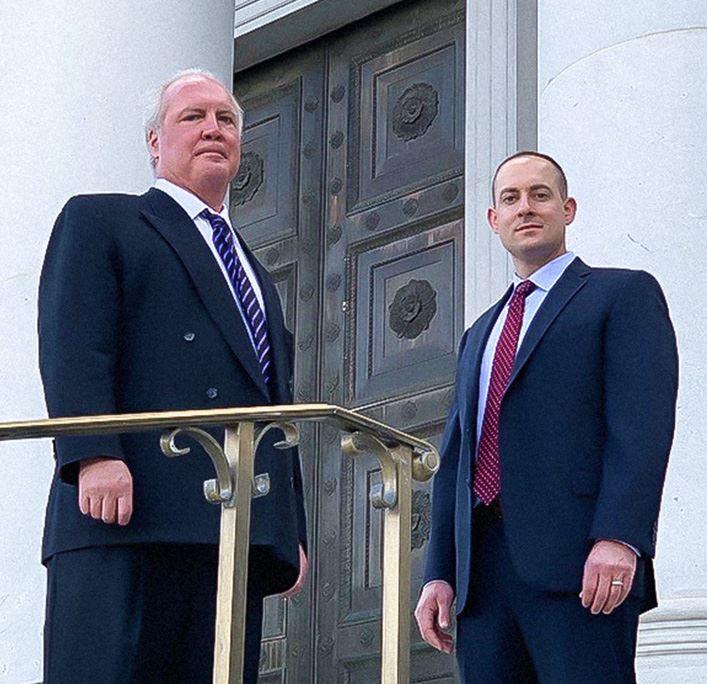
Denver Domestic Violence Lawyer
Defending Clients Facing Domestic Violence Charges in Colorado
At Fife Luneau, P.C., we have dedicated years of our practice to defending people against criminal charges, including domestic violence offenses. We understand that domestic violence cases in Denver often involve circumstances complicated by personal relationships. As a result, we are sensitive to each of our client's experiences and ensure that we treat each case with professional respect and discretion to maintain attorney-client confidentiality.
When someone acts violently or threatens violence against another person, that person may be guilty of the crime of assault. However, when someone uses violence or intimidation against their spouse or significant other, the law considers such an act domestic violence. To effectively navigate these charges, it's imperative to understand how unique factors, such as the history of the relationship and context of alleged incidents, play crucial roles in legal proceedings. Our thorough evaluation of these nuances helps in crafting a defense that considers the full scope of the situation.
Have you been charged with domestic violence in Colorado? Call Fife Luneau, P.C. today at (720) 408-7130 or contact us online to schedule a meeting with our domestic violence attorney in Denver!
Understanding Domestic Violence Laws in Colorado
Under Colorado law, domestic violence is defined as “an act or threatened act of violence upon a person with whom the actor is or has been involved in an intimate relationship.” Colorado law defines “intimate relationship” as “a relationship between spouses, former spouses, past or present unmarried couples, or persons who are both parents of the same child regardless of whether the persons have been married or have lived together at any time.” Understanding this definition is crucial as it affects both the legal strategies employed and the potential outcomes of cases. It is also important to note that non-physical acts, like threats or certain verbal communications, can fall under domestic violence, complicating defenses but also offering avenues for a nuanced legal strategy that we develop diligently.
What Offenses Constitute Domestic Violence?
Offenses that constitute or are related to domestic violence include:
- Misdemeanor domestic violence. A first domestic violence offense constitutes a misdemeanor. Addressing a misdemeanor effectively often involves careful consideration of plea deals and diversion programs, which can minimize life disruptions.
- Felony habitual domestic violence. Subsequent domestic violence offenses may be escalated into a class 5 felony. This escalation significantly increases potential penalties, demanding a strategic legal approach focused on undermining prosecution patterns and evidentiary challenges.
- Violation of a protective order. Violation of a restraining order prohibiting the restrained party from contacting the protected party. Understanding the specific terms of restraining orders and any alleged violations is critical, as these can sometimes lead to additional charges or penalties if not managed effectively.
Contact Our Domestic Violence Attorney Today
Domestic violence charges are a serious matter. Therefore, you need a serious advocate in your corner who you can rely on to fight for your constitutionally guaranteed due process rights to receive a fair criminal proceeding. You should call Fife Luneau, P.C., and consult an experienced Denver domestic violence defense attorney for legal advice. We offer our clients round-the-clock access to our award-winning lawyers, who are also members of the National Trial Lawyers Association.
You can expect us to provide professional and compassionate criminal defense advocacy with personalized attention to the specific needs of your case. We are dedicated to strenuously fighting for your rights and best interests throughout each stage of your criminal proceedings. From police questioning to closing statements at trial, our lawyers will work hard to see your case through to the end. Our commitment is not only to defend but also to educate our clients, ensuring they understand every aspect of their situation and defense strategy.
Denver's Unique Domestic Violence Legal Landscape
Denver, like the rest of Colorado, follows specific legal statutes when it comes to addressing domestic violence. These statutes are designed to protect victims and ensure fair legal processes for individuals accused of domestic violence. Understanding these laws is crucial for anyone involved in such cases. Domestic violence is considered an enhancement in Colorado, meaning that it serves as an additional charge to other offenses like assault or harassment. This means that if you are accused of domestic violence, it's likely that there is another charge involved, complicating the legal battle. Knowing the statutory definitions and penalties is critical for forming an effective defense strategy. Colorado laws also mandate certain procedural steps following an accusation, such as mandatory arrest policies and no-contact orders, which can impose additional hardships and navigating through these rules requires seasoned legal expertise.
The legal landscape around domestic violence in Denver is further complicated by the intersection of family law and criminal law. Issues such as child custody, divorce proceedings, and restraining orders can often tie into criminal cases, affecting their outcomes. At Fife Luneau, P.C., we emphasize a holistic approach, addressing not only the criminal allegations but the broader implications on family dynamics and individual rights. By leveraging our knowledge of both criminal and family law, we aim to mitigate the impact of domestic violence allegations on our clients' personal circumstances. This comprehensive understanding allows us to guide our clients through the multifaceted legal processes involved effectively.
Frequently Asked Questions About Domestic Violence in Denver
What Should I Do If I Am Accused of Domestic Violence in Denver?
If you are accused of domestic violence in Denver, it is imperative to take immediate action to protect your rights. First, comply with any orders issued by the court, such as no-contact orders, to avoid additional legal complications. Contacting a skilled domestic violence attorney in Denver should be your next step, as they can guide you through the legal process and help you understand the charges against you. Refrain from engaging with the accuser or violating any court orders, as these actions can exacerbate your situation. Collect as much evidence as possible, such as text messages or emails, which may support your version of events. Your attorney will work with you to create a defense strategy based on your circumstances, so keeping a detailed account of the events leading up to the accusation can be invaluable.
How Do Denver Courts Handle Domestic Violence Cases?
In Denver, domestic violence cases are taken very seriously by the courts. These cases often proceed rapidly, with initial hearings typically occurring within days of an arrest. The courts follow strict protocols, including mandatory arrest policies when probable cause exists. Defendants often face conditions such as protection orders that must be adhered to while the case is resolved. This can impact day-to-day life significantly, especially if you live with or share children with the accuser. Having strong legal representation is crucial to navigate these conditions and work towards a favorable resolution. Fife Luneau, P.C. is committed to ensuring our clients receive fair treatment while protecting their rights and upholding legal obligations.
What Are the Potential Penalties for Domestic Violence in Colorado?
The penalties for domestic violence in Colorado can vary based on the severity and nature of the accompanying charges. For a misdemeanor, penalties might include fines, probation, mandatory counseling, or community service. Felonies, such as habitual domestic violence, carry more severe penalties, including extended imprisonment. Additional repercussions can affect both criminal and civil rights, including the loss of gun ownership rights and difficulties in securing housing or employment post-conviction. Understanding the full range of potential penalties is crucial when preparing a defense. Therefore, comprehensive legal planning addresses both the present charge and its potential future impact.
Can a Domestic Violence Charge Be Dropped?
Dropping a domestic violence charge in Denver is not as straightforward as simply retracting a complaint. Once charges are filed, the decision to drop them lies with the prosecuting attorney, not the alleged victim. Prosecutors assess the evidence and public interest factors when deciding whether to pursue charges. Factors like the existence of evidence beyond the alleged victim's testimony, prior incidents, and the alleged victim's preference may be considered. Legal representation is invaluable in these circumstances to push for a dismissal or negotiate a favorable resolution. Our team at Fife Luneau, P.C. works diligently to advocate for our clients' best interests in each unique situation.
Why Is It Important to Hire a Local Denver Domestic Violence Attorney?
Hiring a local Denver domestic violence attorney ensures you have professionals who are familiar with local laws, courts, and judges, which can significantly impact the outcome of your case. Local attorneys, like those at Fife Luneau, P.C., understand the specific nuances of Denver’s legal procedures and know how to navigate the local justice system effectively. They build relationships within the community and court system, which can be an asset when negotiating plea deals or understanding how specific judges may view certain charges. Moreover, local attorneys can respond promptly to any developments in your case, providing you with more immediate support and maintaining a high level of communication. Our familiarity with the Denver community allows us to offer personalized service that takes your individual needs and conditions into account.
Contact Fife Luneau, P.C. today to schedule a FREE consultation with our domestic violence lawyer in Denver!

-
 Acquitted of All Charges DUI Acquittal
Acquitted of All Charges DUI Acquittal -
Dismissed DUI, DWAI, Careless Driving
-
Dismissed DUI, DWAI
-
Dismissed Driver’s License Interlock Violation Hearing
-
 Dismissed Attempted Murder, Assault, Menacing with a Deadly Weapon, Distribution of Marijuana
Dismissed Attempted Murder, Assault, Menacing with a Deadly Weapon, Distribution of Marijuana
BECAUSE RESULTS MATTER
Recent Case Victories
Fife Luneau, P.C. is one of the most respected law firms when it comes to DUI and criminal defense cases. We have a remarkable track record up and down the Front Range, successfully handling some of the most complex cases.
- DUI Acquittal
- DUI, DWAI, Careless Driving
- DUI, DWAI
- Driver’s License Interlock Violation Hearing
- Attempted Murder, Assault, Menacing with a Deadly Weapon, Distribution of Marijuana


Have Questions?
-
How should I choose a Denver criminal defense attorney?First and foremost, your lawyer should be confident and knowledgeable in their practice. You should always feel comfortable with discussing the details of your situation and your freedom and your rights should be your counsel’s top priority. At Fife Luneau, P.C., our team has a true passion for what we do, and our experience and zealous advocacy is a testament to this. We have a proven track record for results and will always fight for your best interest.
-
How much are your legal fees?Fife Luneau, P.C. handles cases on an upfront flat-fee schedule that is determined based on how severe your charges, how complex the case, and whether you need to go to trial. We will discuss all issues with you beforehand, and once you agree to our fees, we’ll hold your money in a trust on your behalf. This way we can focus on your matter and not on money. Our firm also accepts all major credit cards.
-
After an arrest, what are my rights?Every U.S. citizen is granted certain rights by the Constitution. These include the face that you are innocent until proven guilty, and that burden is put on the prosecution. After you have been charged, you have the right to a public trial, skilled counsel of your choosing or a court-appointed lawyer, if needed, the right to remain silent to protect yourself from incrimination, the right to cross-examine the accused, the right to testify, or not, and the right to an appeal.

